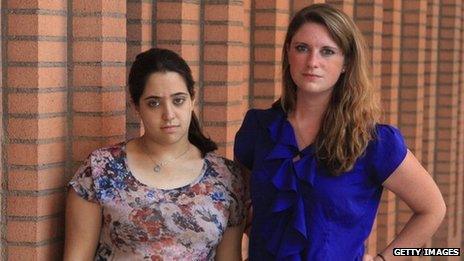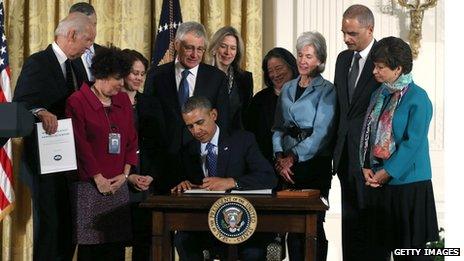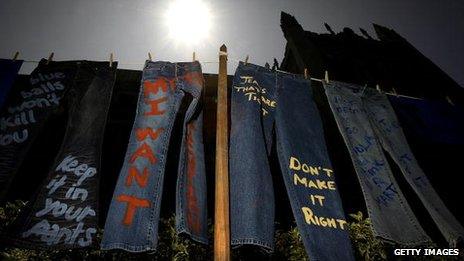Sexual assault survivors challenge universities
- Published
Julia Dixon has filed a complaint against her university for the way it handled her sexual assault case.
One in five American women is sexually assaulted or raped during their time at college and university, according to the White House. Now some survivors are demanding change.
It's been six years since the night Julia Dixon was sexually assaulted, but only now is she sharing her story.
She worked hard to get through high school and win a scholarship to the University of Akron, in Ohio.
Seven days into her new life away from home, she spent the evening watching YouTube videos with two fellow students.
When she returned to her room, they followed. One of the men left. The other refused to go, and assaulted her.
"My life in college was completely destroyed," she says.
Julia's story is an all-too-common one on American university campuses.
President Barack Obama last month set up a task force to tackle college sexual assaults, external.
Many survivors say the universities themselves are failing to deal with the issue.
Obama said the situation was "totally unacceptable" and last month launched a task force to tackle the issue.
The president also called on university officials to examine their reporting and support systems. "Are we doing everything that we should be doing?" he asked.
His words rang true for many survivors of college sexual assault, who argue that the universities have brushed the issue under the carpet for too long.
When Julia tried to pursue the case through the university's disciplinary process, she says she was told she'd have to face her assailant at an internal hearing.
"Three days after he raped me I wasn't in any sort of emotional state to be in the vicinity of him, let alone have a conversation with him about what he did," she says.
She was diagnosed with post-traumatic stress disorder. Her grades slipped, resulting in her losing her scholarship.

Andrea Pino (left) and Annie Clark filed a complaint against University of North Carolina-Chapel Hill over its handling of sexual abuse
"It felt like they didn't really know how to handle it and didn't care to try," she says of the university.
Julia eventually went through the legal system, and saw her attacker serve a short jail term after pleading guilty to a lesser charge.
But she still felt cheated by her university. At the start of February she filed an official complaint against the institution for the way she says they handled her case.
Under the law, current or former students can submit a complaint against their institution if they believe it failed to properly report sexual assaults on campus, or to have a proper policy in place to deal with them. A federal investigation follows.
If a college is found to have failed, it can have its funding withheld or face a fine.
The University of Akron issued a statement in response to Julia's claims. It said it "hadn't received any formal complaint nor has the University been informed by any federal agency that a complaint has been filed.
"With limited exceptions, it would be inappropriate - and a violation of federal privacy laws -for us to discuss information in any student's education record.
"The University policy and practice in sexual assault matters is to separate alleged victims and perpetrators in all phases of the investigation and conduct process. Furthermore, the University has in place a robust system to support students who need help when they are facing situations that are potentially harmful."
A growing number of young women in the US are taking their institutions to task as Julia did.
The US Department of Education is currently investigating more than 35 cases.
Andrea Pino says she was sexually assaulted during her first year at the University of North Carolina, Chapel Hill. She filed a complaint against her college last year.
Along with other survivors she's set up a national advice and support network to encourage people to come forward and lodge complaints.
Andrea believes the issue of college rape is an "epidemic", arguing universities treat it as a "PR problem" which could damage their reputation.
She cites cases where universities have imposed the lightest of penalties on someone accused of rape, such as asking them to write essays, or making them take some time off.
"In so many ways universities think that they can contain it," she says. "They don't treat that person as a criminal, they treat that person as a student who made a mistake and sexual assault is not a mistake."

In January President Obama signed a memorandum establishing a White House task force to protect students from sexual assault
As Andrea's alma mater, the University of North Carolina, Chapel Hill, awaits the outcome of the Department of Education's inquiry, it has revised its policies.
Specially trained co-ordinators have been hired to make it easier for students to file complaints, and extra support and counselling is now being offered.
"The university recognised even before the complaints were filed that we needed to do things better and differently," says Howard Kallem, who co-ordinates these efforts.
It also runs bystander intervention programmes, designed to teach students to step in more effectively. These programmes open up a discussion between students about what is and isn't acceptable sexual behaviour on campus.

University of California students protest against sexual violence on campus
"Is somebody isolating someone and pulling them off in a corner, does someone look uncomfortable, is somebody touching someone on a dance floor in a way that makes people feel uncomfortable?" says Irene Newman, a student who's been trained in the programme.
For Carey Hanlin, who is also taking part in the workshop, it boils down to educating his male peers on campus that no always means no - even if a woman has been drinking or dressing provocatively.
"It's hard. I mean people grow up with it, it's what they are taught from day one," he says.
"Men are supposed to act a certain way, women are supposed to act a certain way and that's one of the things we are indirectly trying to challenge."
The survivors who are speaking up know change will take time, and that just talking about the problem of campus sexual assault won't solve it. But anything, they say, is better than silence.
UK viewers can watch the full Newsnight film on the BBC iPlayer.